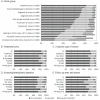Information needs and sources of information for patients during cancer follow-up - PubMed (original) (raw)
Information needs and sources of information for patients during cancer follow-up
M A Shea-Budgell et al. Curr Oncol. 2014 Aug.
Abstract
Background: Now more than ever, cancer patients want health information. Little has been published to characterize the information needs and preferred sources of that information for patients who have completed cancer treatment.
Methods: We used a nationally validated instrument to prospectively survey patients attending a cancer clinic for a post-treatment follow-up visit. All patients who came to the designated clinics between December 2011 and June 2012 were approached (N = 648), and information was collected only from those who agreed to proceed.
Results: The 411 patients who completed the instrument included individuals with a wide range of primary malignancies. Their doctor or health professional was overwhelmingly the most trusted source of cancer information, followed by the Internet, family, and friends. The least trusted sources of information included radio, newspaper, and television. Patients most preferred to receive personalized written information from their health care provider.
Conclusions: Cancer survivors are keenly interested in receiving information about cancer, despite having undergone or finished active therapy. The data indicate that, for patients, their health care provider is the most trusted source of cancer information. Cancer providers should ask patients about the information they want and should direct them to trusted sources.
Keywords: Information-seeking; follow-up care; information needs; survivorship.
Figures
Figure 1
Level of trust in cancer information sources. (A) Whole-group rating of trust in cancer information sources. (B) Rating of trust in a health care provider, by cancer site. (C) Rating of trust in the Internet, by cancer site. (D) Rating of trust in family and friends, by cancer site.
Figure 2
Importance of cancer information topics. (A) Whole-group rating of importance of all cancer information topics. (B) Rating of importance of information about treatment or cures, by cancer site. (C) Rating of importance of information about a specific type of cancer, by cancer site. (D) Rating of importance of information about screening, testing, or early detection, by cancer site. (E) Rating of importance of information about follow-up tests and exams, by cancer site.
Similar articles
- In whom do cancer survivors trust online and offline?
Shahrokni A, Mahmoudzadeh S, Lu BT. Shahrokni A, et al. Asian Pac J Cancer Prev. 2014;15(15):6171-6. doi: 10.7314/apjcp.2014.15.15.6171. Asian Pac J Cancer Prev. 2014. PMID: 25124593 - Health information-seeking behavior of seniors who use the Internet: a survey.
Medlock S, Eslami S, Askari M, Arts DL, Sent D, de Rooij SE, Abu-Hanna A. Medlock S, et al. J Med Internet Res. 2015 Jan 8;17(1):e10. doi: 10.2196/jmir.3749. J Med Internet Res. 2015. PMID: 25574815 Free PMC article. - An internet tool for creation of cancer survivorship care plans for survivors and health care providers: design, implementation, use and user satisfaction.
Hill-Kayser CE, Vachani C, Hampshire MK, Jacobs LA, Metz JM. Hill-Kayser CE, et al. J Med Internet Res. 2009 Sep 4;11(3):e39. doi: 10.2196/jmir.1223. J Med Internet Res. 2009. PMID: 19734128 Free PMC article. - Cancer survivors' use of numerous information sources for cancer-related information: does more matter?
Blanch-Hartigan D, Blake KD, Viswanath K. Blanch-Hartigan D, et al. J Cancer Educ. 2014 Sep;29(3):488-96. doi: 10.1007/s13187-014-0642-x. J Cancer Educ. 2014. PMID: 24699921 - The National Cancer Institute's Health Information National Trends Survey [HINTS]: a national cross-sectional analysis of talking to your doctor and other healthcare providers for health information.
Volkman JE, Luger TM, Harvey KL, Hogan TP, Shimada SL, Amante D, McInnes DK, Feng H, Houston TK. Volkman JE, et al. BMC Fam Pract. 2014 Jun 6;15:111. doi: 10.1186/1471-2296-15-111. BMC Fam Pract. 2014. PMID: 24906558 Free PMC article.
Cited by
- Informational needs and predictors of Jordanian breast and colorectal cancer survivors: a national cross-sectional study.
Melhem SJ, Nabhani-Gebara S, Kayyali R. Melhem SJ, et al. Support Care Cancer. 2022 Aug;30(8):6827-6837. doi: 10.1007/s00520-022-07110-6. Epub 2022 May 10. Support Care Cancer. 2022. PMID: 35538325 Free PMC article. - Digital Trends, Digital Literacy, and E-Health Engagement Predictors of Breast and Colorectal Cancer Survivors: A Population-Based Cross-Sectional Survey.
Melhem SJ, Nabhani-Gebara S, Kayyali R. Melhem SJ, et al. Int J Environ Res Public Health. 2023 Jan 13;20(2):1472. doi: 10.3390/ijerph20021472. Int J Environ Res Public Health. 2023. PMID: 36674237 Free PMC article. - Readability of English, German, and Russian Disease-Related Wikipedia Pages: Automated Computational Analysis.
Gordejeva J, Zowalla R, Pobiruchin M, Wiesner M. Gordejeva J, et al. J Med Internet Res. 2022 May 16;24(5):e36835. doi: 10.2196/36835. J Med Internet Res. 2022. PMID: 35576562 Free PMC article. - Stress and Quality of Life in Cancer Patients: Medical and Psychological Intervention.
Barre PV, Padmaja G, Rana S, Tiamongla. Barre PV, et al. Indian J Psychol Med. 2018 May-Jun;40(3):232-238. doi: 10.4103/IJPSYM.IJPSYM_512_17. Indian J Psychol Med. 2018. PMID: 29875530 Free PMC article. - Perceptions of Oncology Providers and Cancer Survivors on the Role of Nutrition in Cancer Care and Their Views on the "NutriCare" Program.
Keaver L, Yiannakou I, Folta SC, Zhang FF. Keaver L, et al. Nutrients. 2020 Apr 30;12(5):1277. doi: 10.3390/nu12051277. Nutrients. 2020. PMID: 32365871 Free PMC article.
References
- Lock KK, Willson B. Information needs of cancer patients receiving chemotherapy in an ambulatory-care setting. Can J Nurs Res. 2002;34:83–93. - PubMed
LinkOut - more resources
Full Text Sources
Other Literature Sources

